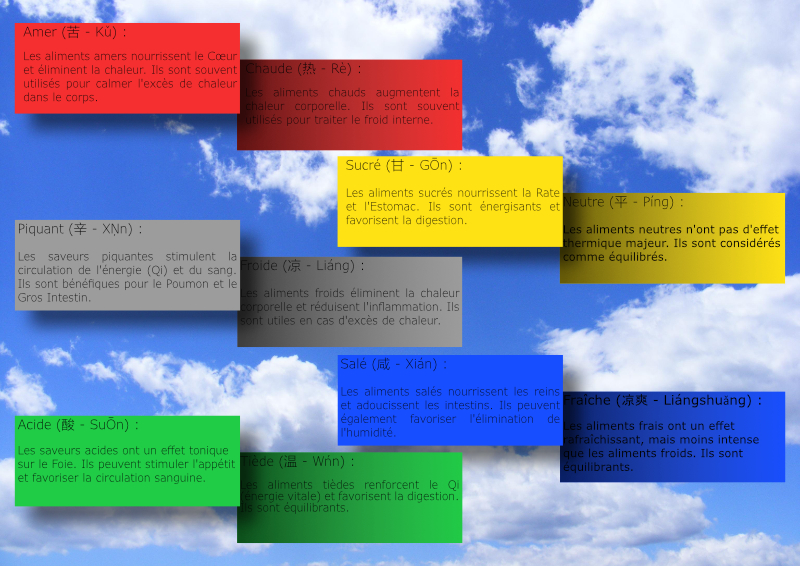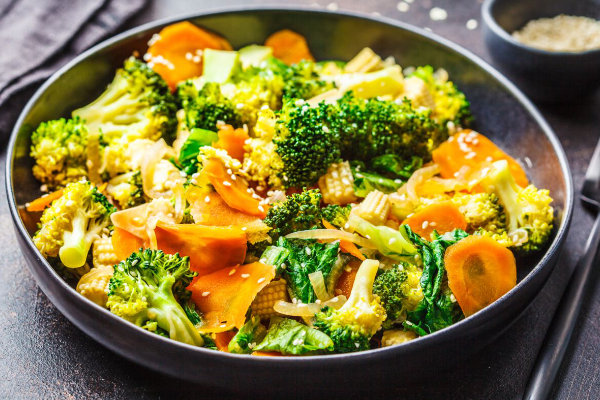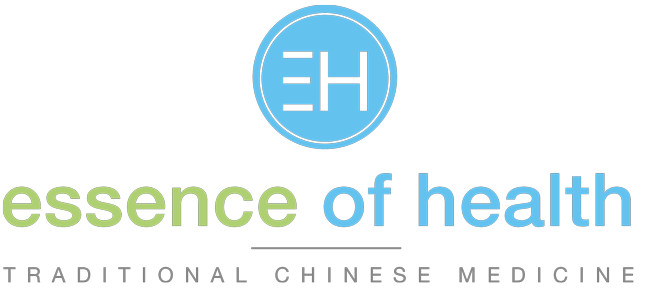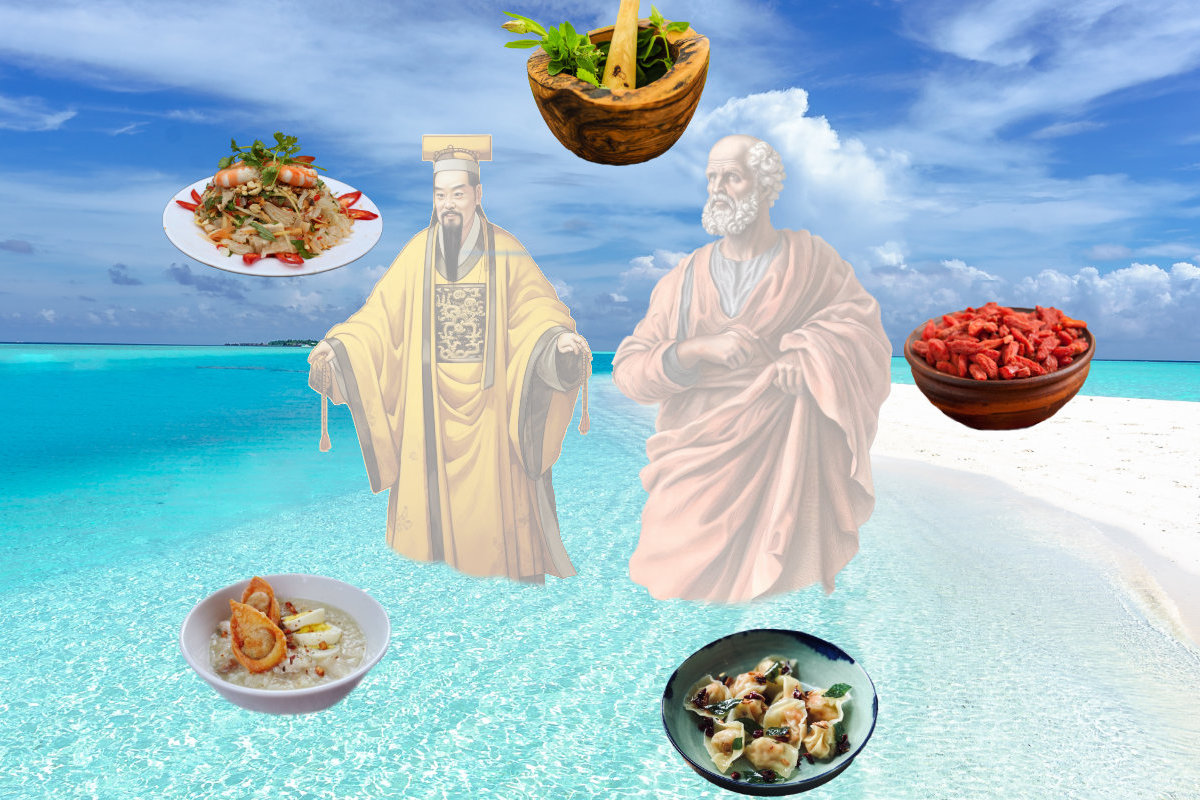Balancing vital principles through food
Chinese dietetics is an essential component of traditional Chinese medicine (TCM). It is based on thousands of years of observation and understanding of the relationship between food and health. “Let your food be your medicine”, said Hippocrates, the founding father of Western medicine, in the same spirit as Huang Di, one of the major figures of Traditional Chinese Medicine.
The overall aim of Chinese dietetics is to ensure the proper functioning of the Jing. Jing is the basic energy inherent in every individual, and is considered one of the “Three Treasures” of Chinese medicine, along with Qi and Shen.
As a reminder, yin represents tissues and organs. If it is deficient, symptoms such as dryness, the production of abnormal internal heat and sleep disturbances may result. Yang, on the other hand, refers to the functioning of organs and organic systems such as digestion… Insufficient yang can lead to symptoms such as diarrhoea, fatigue and even depression.

So food must be as alive as possible, at the height of its vitality, its “Jing”. It is this Jing from the plant that will nourish our own vitality, our own “Jing”.
In Chinese culture, food is considered by its energetic capital. It is a gift from Nature, which must nourish not only our physical needs, but also our mental and spiritual ones. A Chinese proverb says: “To eat is to reach for Heaven”.
Food must be as unprocessed and natural as possible, to fill us with its vitality and make us even more alive.
Chinese dietetics obeys the founding principles of Chinese medicine. Its aim is to readjust the energetic balance of the human being, according to his or her constitution and health. It’s a common-sense dietetic approach that encourages us to be in harmony with Nature, consuming fresh, locally-grown, seasonal produce.
The essence of the food and beverages consumed generates Qi, which supplements “acquired” Jing. For qi to supplement Jing sufficiently, it’s important that meals are adapted to each individual’s specific energy needs at any given time.
Food classification
In Chinese dietetics, foods are classified, among other things, by flavor and nature in relation to the theory of the five elements. The five elements are represented by their color in the table below: red for fire, yellow for earth, gray for metal, blue for water and green for wood.

This table quickly illustrates that, to maintain good health, human beings need to eat as varied and lively a diet as possible, as mentioned above in relation to Jing.
Digestion or Xiǎo Huà
Ingested food is transformed so that the body can draw from it the elements it needs. Xiǎo huà, digestion, literally means to disperse and transform. The food and liquids consumed break down, then transform through the process of digestion. Like a cauldron (the stomach), food and drink are first fermented, cooked, then broken down and transformed into food porridge.
This process takes place under the action of food fire, which transforms food and drink to produce Qi.
To achieve this, the spleen and stomach work together in interaction to ensure the digestion process. More precisely, it is under the impulse of the spleen, associated with the energy of the kidneys, that our “cauldron” separates the “clear” from the “turbid”.
The clear corresponds to the nutritive energy of food, which serves as the basic material for the elaboration of energy and blood in the body. The turbid represents unassimilable substances that are eliminated as waste (in urine and feces).
Digestion or Xiǎo Huà
Ingested food is transformed so that the body can draw from it the elements it needs. Xiǎo huà, digestion, literally means to disperse and transform. The food and liquids consumed break down, then transform through the process of digestion. Like a cauldron (the stomach), food and drink are first fermented, cooked, then broken down and transformed into food porridge.
This process takes place under the action of food fire, which transforms food and drink to produce Qi.
To achieve this, the spleen and stomach work together in interaction to ensure the digestion process. More precisely, it is under the impulse of the spleen, associated with the energy of the kidneys, that our “cauldron” separates the “clear” from the “turbid”.
The clear corresponds to the nutritive energy of food, which serves as the basic material for the elaboration of energy and blood in the body. The turbid represents unassimilable substances that are eliminated as waste (in urine and feces).
A diet full of vitality
TCM therefore considers diet to be the first of all remedies. Along with breathing, it is the main source of our energy. A poor diet leads to low-quality energy, which is detrimental to health and vitality. In the Chinese tradition, foods are considered according to their impact on the body.
The table seen above enables us to understand the mechanism of Chinese dietetics, which classifies foods according to their color, nature and flavor, according to the 5 elements.
In principle, the plate should feature the 5 flavors and 5 colors (with a dominant color depending on the current season). Each flavor nourishes a specific organ. In this way, dietetics can be used to heal by directing the patient towards foods that will restore his or her energy balance.
If you’re in good health, and want to stay that way, make sure your diet includes a variety of flavors (acid, bitter, sweet, pungent, salty) and natures (hot, cold, fresh, lukewarm, neutral) to maintain energetic harmony in the body.

Some principles of Chinese dietetics
Adapt your diet to the seasons and climate. For example, choose warm foods in winter and cool foods in summer to maintain balance.
Choose fresh, local food, preferably grown naturally.
Take the time to eat slowly and savor every bite. Absolutely avoid eating while watching TV or using electronic devices.
Aim to balance Yin (cold) and Yang (hot) foods in your diet to maintain harmony between opposing energies.
Don’t overload your stomach. Eat until you are satisfied, but not too full.
Drink water at room temperature or lukewarm; avoid iced drinks, as they can extinguish the fire of digestion, and thus harm it.
Choose cooking methods that preserve the nutritional value of food, such as steaming, gentle steaming or slow cooking. Avoid raw foods, which are more difficult to digest, and can therefore exhaust the spleen.
Above all, pay attention to your body’s signals. If you experience digestive imbalances or discomfort, adjust your diet accordingly. Consult us to determine your individual constitution and adjust your diet accordingly.
Basics for maintaining a healthy diet
The five flavors – Foods are categorized into five flavors: sweet, bitter, salty, sour and pungent. Each of these flavors has specific properties that affect organs and emotions. The balance between these flavors is essential.
Harmony of the elements – According to TCM, the five elements (wood, fire, earth, metal, water) are associated with different organs. Eating foods in harmony with these elements helps maintain balance.
Seasonality – Chinese dietetics recommends eating seasonal foods, as they are thought to be more suited to the body’s needs at that time.
Food preparation – The way food is prepared is crucial. Steaming, gentle cooking and woks are preferred, while excessive frying is avoided.
Avoid excess – Overeating, eating too quickly or too slowly, or depriving yourself of food can unbalance the body. Moderation is the key.
Listen to your body – Chinese dietetics encourages you to pay attention to your body. Hunger and satiety signals must be respected.
Individualization – Each person is unique. Chinese dietetics takes into account individual constitution, specific imbalances and unique needs.
The importance of beverages – Hot beverages such as tea are favored, as they are considered beneficial for digestion.
Food hygiene – Cleanliness of food and the environment in which it is prepared is crucial to avoid illness.



0 Comments